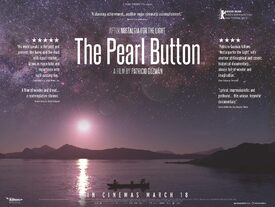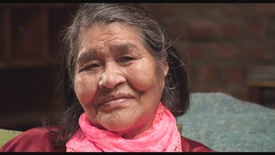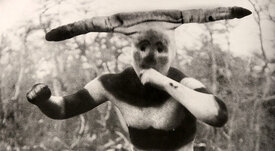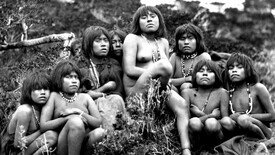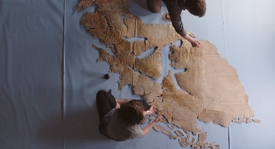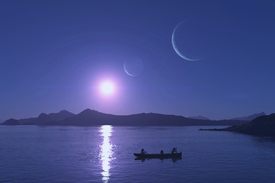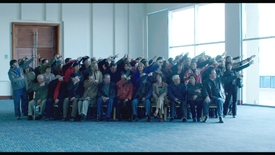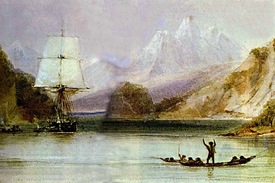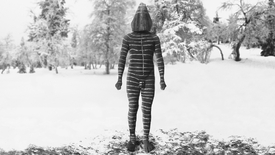Cinema Releases - The Pearl Button
After the acclaimed Nostalgia for the Light (Nostalgia de la Luz, 2010), with its study of the desert, the stars, light and time, as well as the recent memory and remains of disappeared people in North Chile under Pinochet, Patricio Guzmán takes us on a journey into the water and ocean of Southern Chile.
The sea holds all the voices of the earth and those that come from outer space. Water receives impetus from the stars and transmits it to living creatures. Water, the longest border in Chile, also holds the secret of two mysterious buttons which were found on its ocean floor. Chile, with its 2,670 miles of coastline and the largest archipelago in the world, presents a supernatural landscape. In it are volcanoes, mountains and glaciers. In it are the voices of the Patagonian Indigenous people and their tragic history, the first English sailors and also those of its political prisoners. Some say that water has memory. This film gives it a voice. Using both archival images and gorgeous new footage, The Pearl Button (El botón de nácar) manages once again to convey different periods of history and geography in a gripping tale of our modern world.
Silver Bear for Best Script, Berlin Film Festival
Documentary Competition, London Film Festival 2015
Available on Curzon Home Cinema and BFI Player
Buy the DVD
Patricio Guzmán was born in Santiago de Chile in 1941. The director of the Chilean trilogy The Battle Of Chile is one of the great filmmakers of Latin American cinema. As an adolescent, he was inspired by the work of Chris Marker, Frederic Rossif and Louis Malle. Patricio Guzmán studied filmmaking in Chile and Spain where he graduated in 1970. He returned to Chile in 1971 and directed his first documentary, The First Year, which covered the first 12 months of Salvador Allende's government. Chris Marker, impressed by the film, offered to help get it seen in France. Two years later, Marker again provided invaluable assistance when he donated the raw stock necessary to commence filming The Battle of Chile, Guzmán’s trilogy about Allende's final year. Filming on this project continued until the very day of the coup. That day, Guzmán was imprisoned in Santiago's infamous football stadium, where he remained for 15 days. He was able to get out of Chile in late November 1973, with the film material for his trilogy in his luggage. The film was edited in Cuba and released to great acclaim. He has since directed a number of award-winning documentaries, mostly focused on Chilean concerns, including In God's Name, about the Catholic Church's fight for human rights in Chile, and Chile, Obstinate Memory, which addresses collective political amnesia. Nostalgia For The Light won the documentary award from the European Film Academy in 2010. The Pearl Button is the second film of what will become a trilogy. It was awarded the Silver Bear for best script at the Berlin Film Festival (2015).
Selected Filmography
2015 The Pearl Button (El botón de nácar)
2010 Nostalgia for the Light (Nostalgia de la Luz, 102').
2005 My Jules Verne (Mon Jules Verne, 52’)
2004 Salvador Allende (102').
2001 The Pinochet Case (Le Cas Pinochet, 110´).
1999 La Isla de Robinson Crusoe (43´).
1997 Chile, Obstinate Memory (Chile, la memoria obstinada, 58’).
1995 Pueblo en Vilo (52’).
1992 The Southern Cross (La Cruz del sur, 80’).
1986-87 In the Name of God (En nombre de Dios, 100’).
1985 Pre-Columbian Mexico (5 x 30´).
1985 Rosa de los vientos
1979 The Battle of Chile III (La Batalla de Chile: El poder popular)
1977 The Battle of Chile II (La Batalla de Chile: El golpe de estado)
1975 The Battle of Chile I (La Batalla de Chile: La insurrección de la burguesía)
1972 La Respuesta de octubre
1971 The First Year (Primer año, 100’), with a prologue by Chris Marker.
1969 El Paraíso ortopédico
1968 La Tortura y otras formas de diálogo
|
Writer and Director |
Patricio Guzmán |
|
Producer and Artistic Advisor |
Renate Sachse (Atacama Productions) |
|
Photography |
Katell Djian |
|
Editing |
Emmanuelle Joly |
|
Sound Recording |
Álvaro Silva Wuth |
|
Original Soundtrack |
Miranda & Tobar, Hughes Maréchal |
|
Assistant Director |
Nicolás Lasnibat |
|
Additional Photography |
Patricio Guzmán, David Bravo, |
|
Yves de Peretti, Patricio Gianfranco, Raúl Beas |
|
|
Still Photography |
Martín Gusinde, Paz Errázuriz |
|
Sound editing and Mix |
Jean-Jacques Quinet |
|
Executive Producer and Production Coordinator |
Adrien Oumhani |
|
Line Producer in Chile |
Verónica Rosselot |
|
Co-producers |
Bruno Bettati, Fernando Lataste, Jaume Roures Llop |
|
Co-production Companies |
Valdivia Film, Mediapro, France 3 Cinema |
|
Filmed in HDCAM |
|
|
France - Chile - Spain - 82 minutes - 1:85 |
★★★★★
'Unmissable...The Pearl Button is another Patricio Guzmán film. So unpack the superlatives…This documentary holds every card in the pack, from geology to anthropology to the history of tribes and tyrants, and plays them like a master.'
Nigel Andrews, The Financial Times
★★★★★
'Patricio Guzmán cinema travels through time and space with the seamless ease of a whisper. Humanist and historical, intergalactic and elemental, his films are deceptively dense. One moment could be mired in the trauma of Chile’s dictatorial Pinochet era, and the next ascending to the heavens or dipping underneath the water’s surface. Malleability remains a crucial component for a filmmaker working so thoroughly in the cross section between national history and personal memory… Grows in magnitude and importance with each passing day.'
Glenn Heath, Little White Lies
★★★★
'It really is intelligent, magnificent film-making.'
Andrew Pulver, The Guardian
★★★★
'Patricio Guzmán's essay-style documentary is a deceptive but very moving affair.'
Geoffrey Macnab, The Independent
★★★★
'The Pearl Button is a piece of visual poetry that meanders along the waterways, coastline and history of Chile, coming into sharp and horrifying focus on the atrocities of Augusto Pinochet’s dictatorship....visually stunning.'
Kate Muir, The Times
'Guzmán’s 2010 film Nostalgia for the Light is one of the past decade’s great films, and The Pearl Button is a worthy companion piece. This is a film of masterly artistry, heaving political anger and uncontained ambition.'
Ed Lawrenson, The Big Issue
'The Pearl Button is ultimately about cinema’s unique way of retelling the past, about a visual language that links Pinochet’s victims to the Yámana peoples through the image of a button. Water is ultimately the conduit that Guzmán uses to bind the different memories into a bold, poetic narrative that asks profound questions of humanity and indeed of cinema’s responsibilities to the wider world.'
Maria Delgado, Sight & Sound
'Guzmán combines science, metaphor and narrative ingenuity to create a kind of metaphysical history lesson about the relationship between water, the cosmos and political turmoil in Chile. A film of wonder and dread, where the ‘language of water’ helps us better understand of the language of impunity, The Pearl Button is a contemplative stunner.'
Robert Greene, Sight and Sound ('The Best of 2015 in Cinematic Nonfiction')
★★★★‘Patricio Guzmán follows ‘Nostalgia for the Light’ with another philosophical and cosmic historical documentary…always full of wonder and imagination.’
Dave Calhoun, Time Out
★★★★
'Filled with stunning images and steered by a restless curiosity, The Pearl Button is incredibly beautiful.'
Allan Hunter, The Daily Express
★★★★
'An astoundingly beautiful visual essay which revels in the stunning scenery of Chilean Patagonia, it morphs into a harrowing depiction of the nation's distant and recent past.'
Matthew Anderson, Cinevue
‘It is the director’s extraordinary intuition about the synchronicity of history, geography and the physical universe – a mysterious relationship that has nothing to do with cause and effect – that gives the film and its predecessor their undeniable power. Watching them opens up mental windows, unknown vistas appear, subliminal connections are made.’
Deborah Young, The Hollywood Reporter
'lyrical, impressionistic and profound...Gorgeous cinematography by Katell Djian plus compelling archival and portrait photos round out this unique, hypnotic documentary.'
Garry Goldstein, Los Angeles Times
'A stunning achievement…another major cinematic accomplishment.
Guzman's unique gift lies in his ability to weave together multiple modes of documentary: the picturesque, the political and the poetic …"The Pearl Button" is a vivid, essential portal to understanding not only the heritage of a nation, but also the art of nonfiction cinema.
Kevin B. Lee, Indiewire
‘…poetically shot gem.’
Peter Yeung, The Daily Telegraph
‘…an elegant essay that ties together the horrors of colonialism with those of the Pinochet era and makes great plays of elemental matters in a similar way to Nostalgia for the Light.’
Nick James, Sight and Sound
'Film of the week...Guzmán now follows Nostalgia, a film made under the sign of dryness, with its counterpart, a contemplation of water...eerie, impressionistic...The Pearl Button has no shortage of documentary force or of imaginative seriousness.'
Jonathan Romney, Film Comment
‘Deeply poetic… humanist meditation on buried traces of the past and how they determine our present and future as a race and as a civil society.’
Lee Marshall, Screen International
'Mr. Guzmán begins by simply depicting water and landscapes with mind-altering nature photography that primes us for his meditations on memory and loss... His introspection finds a kind of justice through poetry, and shows how memory must always be a continuing process.'
Nicolas Rapold, The New York Times
'Gorgeous documentary'
Sherilyn Connelly, SF Weekly
'stunning'
J. R. Jones, The Chicago Reader
★★★★★
‘Looking at all these themes on paper, there is no way they should be able to co-exist within the same film, let alone do so in harmony, but Guzmán lets each wave of thought flow over the other, tributaries of history gathering to a ocean of argument that carries you with it at once transfixed by the beauties of the cosmos and the horrors of man's inhumanities to man.’
Amber Wilkinson, Eye for Film
'While there is so much in this film, so many thoughtful, inspiring and tragic ideas about water and stars and memory and music, this is what will probably stay with me longest: Guzman's beautiful, heartbroken narration as he tries to make sense of the senseless fact that, for centuries, the powerful have been able to weigh the value of the lives of the powerless, and be it a single body underneath the waves, or a whole people, they have judged them worthless.'Jessica Kiang, The Playlist
'Many of the natural images Guzmán offers — bodies of water, glaciers, mountains — are wondrously beautiful. The account of what happened to the natives is powerful, and the filmmaker’s narration is lyrical and haunting... This is history of a personal and meditative sort...'
Walter Addiego, San Francisco Chronicle
Clip 1 (can be downloaded): The Prisoners of Dawson
Clip 2 (can be downloaded): Not Chilean but Kawesqar
Trailer on vimeo - can be downloaded
Download hi-res jpg of Poster
Download Pressbook
Download photo set jpegs
Download 4 tiff photos
Download A3 and A4 posters (can be printed for local use)
Watch the Q&A from the London Film Festival
Download French educational resource for Spanish language pupils
Interview with Patricio Guzmán in Film Comment
NY Review of Books on recently published book of photographs by Martin Gusinde, The Vanished Tribes of Tierra del Fuego
The book is available in the UK from Thames and Hudson or Amazon
Exhibition catalogue (72 page pdf) for Los Nómadas del Mar by Paz Errázuriz - photographs of the Kawesqar people.
Interview with Patricio Guzmán in Cinevue
